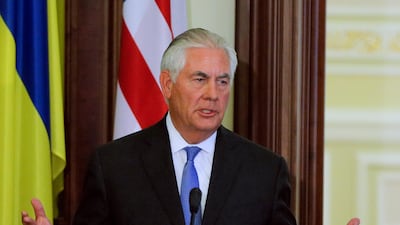Washington // US secretary of state Rex Tillerson arrives in Kuwait on Monday in an urgent bid to break the current impasse in the regional dispute with Qatar and prevent an escalation.
Mr Tillerson “will meet with senior Kuwaiti officials to discuss ongoing efforts to resolve the Gulf dispute,” the state department said on Thursday.
The US has become “increasingly concerned that the dispute is at an impasse at this point,” Heather Nauert, the spokesperson for the department, said.
The dispute burst into the open last month when Saudi Arabia, the UAE, Egypt and Bahrain broke diplomatic relations with Qatar and started a trade and travel boycott against the country over its support of extremist groups.
Kuwait has been mediating between the quartet and Qatar, which has refused to accept a list of demands to change its behaviour.
While no clear schedule has been provided, Mr Tillerson’s trip would “span over several days” western diplomatic sources said. The secretary of state will either remain in Kuwait for several days to host Gulf officials, or alternatively, he will shuttle between different GCC capitals throughout the week.
Mr Tillerson’s increased involvement more than a month after the row erupted is “an important and loud message”, said Marcel Wahba, president of the Arab Gulf States Institute in Washington.
Ms Wahba, who served as ambassador to the UAE, said there was a new sense of urgency in the US effort to move the needle on the dispute.
“A US secretary of state doesn’t go to the region for days and shuttle between capitals unless it’s an urgent situation,” she said.
Kuwait has been tasked as the main interlocutor, but the US also has “solid relationships and leverage with all the players,” Ms Wahba added.
But she said the US should have acted earlier and waiting six weeks to travel to the region is a lapse in US diplomacy.
"In the Middle East, when you have a conflict with strong narratives on both sides, people take positions that they later have a hard time compromising,” she said.
Ms Wahba said the delay in Mr Tillerson’s visit was mostly to give space to the Kuwaiti mediation efforts. “But until you are actively on the ground, going to meet with those leaders, it is not the same message," she said.
Mr Tillerson has had trouble in the last few weeks pushing a unified US message on the dispute, and his statements at times were different from the White House and the tweets and private remarks from Donald Trump.
“I assume Mr Tillerson now has backing from the White house, though it’s not always clear, the scope and the duration of trip says he has” Ms Wahba said.
The goal of the visit should be to “institute a dialogue between the players and prevent escalation," she added. "If the dialogue is not productive and people are not talking specifics about taking actionable steps on all sides then we may see escalation. You can’t continue to have Qatar say no to everything, and then have the other side counter by escalation.”
The former ambassador advised that the US can use the leverage of weapons sales and military presence to push for a deescalation. “The message to Qatar has to be very clear which it has not been so far, that Doha has to change lot of things, it can’t be a sanctuary for individuals on both UN and US designated terrorist lists, and it cannot provide Al Jazeera Arabic as a platform for hate speech and extremists’ voices.”
To the other side, the US has to make it clear said Ms Wahba that “we cannot continue with this crisis and have it escalate to the point where regional stability is at stake and the fight against ISIL is undermined.”
In the Gulf, “everyone is waiting for Tillerson out of courtesy, and to see what the US can bring to the table.”


